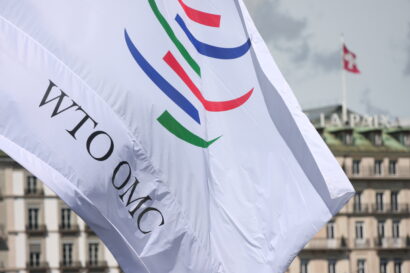Trump’s new investigation is only the latest skirmish in this new divide.
Last week, President Trump ordered an investigation into France’s new tax on Apple, Facebook, Google and other large digital companies. The administration is considering strong retaliatory measures, on the grounds that it unfairly targets U.S. companies.
This is the latest stage in a long-running battle. France introduced its “digital services tax” because it felt that the Group of 20 nations weren’t making progress toward a new global agreement on taxing technology companies. Britain, Spain, Italy and others are pursuing similar taxes.
Some commentators view the Trump probe as just “a new angle of attack” in an ongoing transatlantic rift between the United States and Europe. But our research, just published in the Review of International Political Economy, shows that the rise of global tech companies is breaking historical alliances between countries and leading to bitter new disputes.
Europe is suddenly targeting Big Tech with new taxes
Some European governments believe that digital companies like Apple, Facebook and Google are not paying their fair share in taxes. They see Big Tech companies earning billions from European users, benefiting from European infrastructure, and paying little or no tax to European governments. Unsurprisingly, they want to change this.
However, this might mean significant losses for the United States. Big tech companies have predominantly been taxed in their home countries, which is often the United States. These new digital taxes would mean that European governments could take some of the U.S. slice of the pie.
Naturally, U.S. political leaders are not happy and have started to claim that these digital taxes are discriminatory, anti-U.S. campaigns. Trump’s new investigation is only the latest critical outburst. In 2016, the Obama administration criticized the European Union over a decision requiring Apple to settle almost $20 billion in unpaid taxes to Ireland.
Senate leaders also warned Britain that it will not get a trade agreement with the United States if it imposes a digital services tax.
Tax policy is splitting the transatlantic alliance
Usually, rich Western governments smooth over their international disagreements about corporate tax policies in forums like the G-20 and the OECD (Organization for Economic Cooperation and Development). However, they have made little progress in discussing how to tax the digital economy, which has been underway since 2013.
It is always hard to reach agreement on taxes, because what one government wins, another usually loses. But now it is even harder because of the way that the political dynamics of global taxation have shifted over the last decade.
The rise of big technology companies has splintered the U.S.-Europe coalition. The United States benefits from the economic power of Apple, Facebook, Google and other such companies, while countries without any digital giants of their own — notably France, Germany, and Britain — do not. This pits the former allies against each other in global negotiations.
Emerging economies complicate things further
Interestingly, the United States is finding that it has shared interests with China, which stands to lose because special taxes aimed at big technology firms will hit its own global tech giants, such as Alibaba and Tencent. France, for its part, has common interests with India, whose large market means it would gain from new taxes based on where users and sales are located, rather than where their corporate headquarters are.
However, while China and India have some overlapping interests with the competing factions in the United States and Europe, they also have their own, more radical agendas. Negotiations used to feature only a small group of Western nations, but now 131 countries have a seat at the table through the OECD’s “Inclusive Framework.” This means more governments involved in discussions, more divergent interests, and thus more difficulty in reaching agreement.
Public interest makes agreement harder
All this is happening under unprecedented levels of media scrutiny. Corporate tax policy used to seem boring, but Britain now sees regular newspaper stories about the minimal amounts of tax paid by big U.S. tech companies, while French and German politicians have harsh words for tech company tax havens like Ireland.
This means that policymakers are under increasing pressure to act swiftly and hang tough. One of the reasons France is introducing the digital tax is to jump-start global negotiations; France promises to abandon its new tax if a global agreement is reached. However, if countries launch a plethora of unilateral initiatives, it’s doubtful whether it will lead to a sustainable global solution.
It is unclear whether there will be a global agreement
The outlook for a new global tax agreement is muddy. None of the current options appears to satisfy its stakeholders. The OECD and G-20 have discussed several different ways to settle the question. The Inclusive Framework’s most recent Program of Work hints at a solution that favors countries with large markets by allowing taxation where sales take place. But it also acknowledges how hard it will be to get all parties to agree to this.
Negotiators have promised an agreement by 2020 — but reaching global consensus that soon looks unlikely. If they do not, the politics are likely to get harder, and more countries may pursue unilateral initiatives like the French tax.
Originally published as “Europe is targeting Big Tech with new taxes. It’s straining the transatlantic alliance” in The Monkey Cage at The Washington Post on July 18, 2019. Reprinted with permission.


